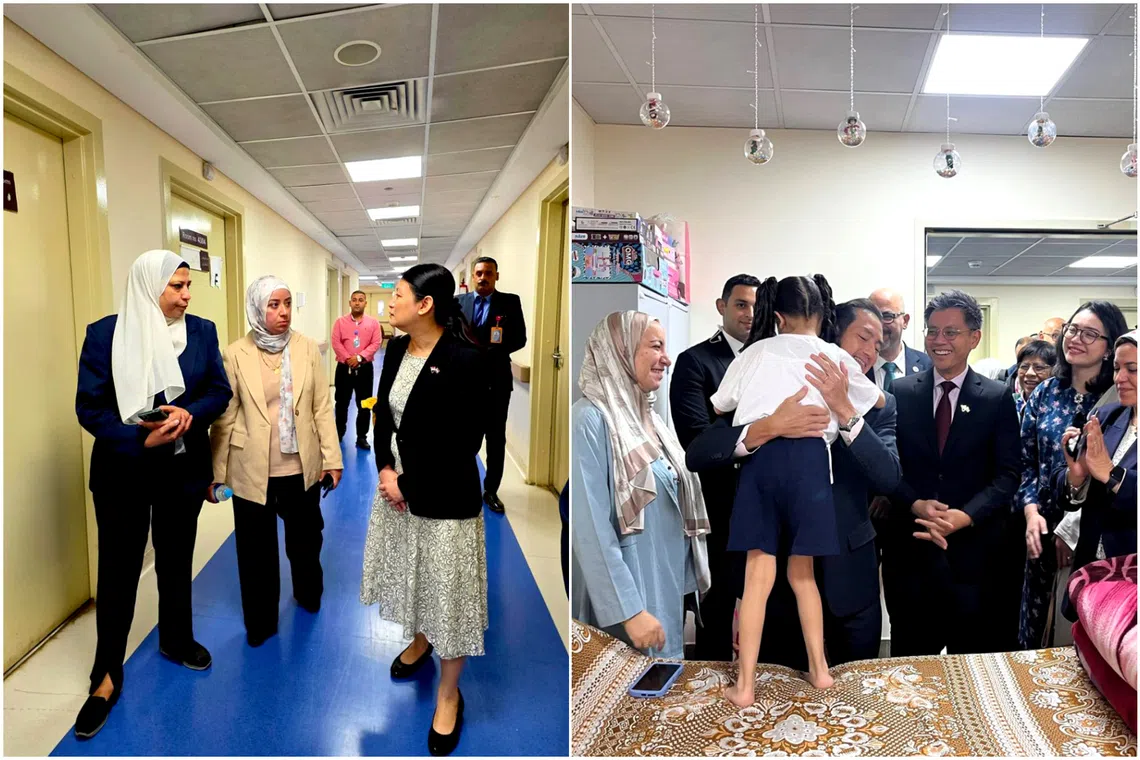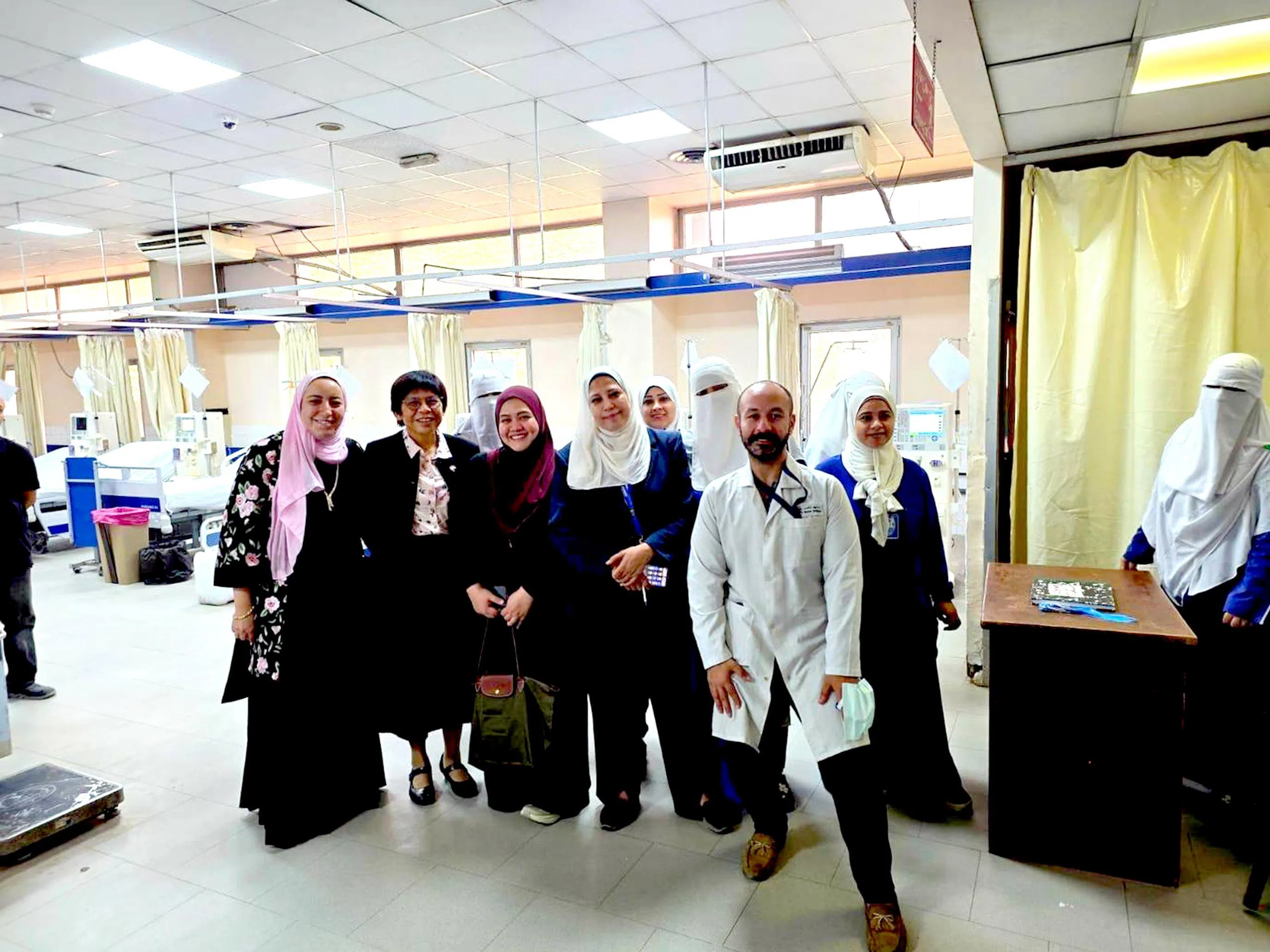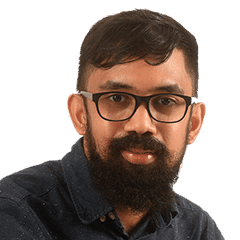Singapore medical team moved by resilience of sick Palestinian children in Cairo hospital
Sign up now: Get ST's newsletters delivered to your inbox

A Singaporean team of healthcare professionals specialising in treating children visited Nasser Institute Hospital in Cairo, Egypt, between Sept 20 and 22.
PHOTOS: MINISTRY OF HEALTH, TAN KIAT HOW/FACEBOOK
- A Singaporean medical team visited Palestinian patients evacuated to Cairo's Nasser Institute due to the Gaza conflict, including children with kidney disease.
- NUH's Professor Yap Hui Kim highlighted the resilience of the young patients and discussed diagnosis and transplant options for a six-year-old girl with a possible genetic condition.
- Clinical Associate Professor Joyce Lam Ching Mei of KK Women’s and Children’s Hospital shared insights on managing a rare blood disorder after a Palestinian boy's death and invited Nasser Institute to medical conferences.
AI generated
SINGAPORE – As the world watched transfixed at the conflict in her home town in Gaza, a six-year-old Palestinian girl lay in a hospital hundreds of kilometres away, fighting her own battle against kidney disease.
Despite undergoing dialysis three times a week, she was in good spirits – her positive attitude belying the scars of what she has endured.
The young girl was among about 150 sick and injured Palestinians who were evacuated from Gaza more than a year ago to Nasser Institute Hospital in Cairo, Egypt.
Some of the patients who remain in the hospital, including two children with kidney disease, were visited between Sept 20 and 22 by a Singapore team of healthcare professionals specialising in treating children.
The medical team included the first foreign doctors that Egypt has allowed to be deployed to its hospitals
One of them, the National University Hospital’s (NUH) Professor Yap Hui Kim, was struck by the resilience of the young patients.
Prof Yap, 71, is head and emeritus consultant of the paediatric nephrology, dialysis and renal transplantation division at the Khoo Teck Puat – National University Children’s Medical Institute at NUH.
Speaking to The Straits Times on Oct 2, Prof Yap said: “These kids are truly very resilient and they make the most of where they are. Whatever trauma they may have gone through is not something that we can see outwardly.
“They are very happy to see visitors, interact with visitors. In a sense, that’s why we are paediatricians. We really enjoy seeing the kids because you can see that they bounce back very fast.”
The air strikes, bombing and ground-level fighting in Gaza – part of Israel’s retaliation against the Oct 7, 2023, attack by Hamas
In the months since the Palestinian evacuees were given safe passage out of the war zone, some of them have succumbed to their illnesses at Nasser Institute Hospital, while others were discharged.
Ten remain, comprising the two young kidney patients, a teenager with brain tumour on palliative care, several adults with cancer and one who underwent reconstructive surgery for an injury suffered as a result of the conflict in Gaza.
Prof Yap was joined at the hospital by Clinical Associate Professor Joyce Lam Ching Mei, 48, a senior consultant for paediatric haematology and oncology at KK Women’s and Children’s Hospital, and Ms Noor Haziah Hussain, 46, a senior nurse manager at NUH’s paediatric department.
Prof Yap said one of the issues that they discussed with the doctors at Nasser Institute Hospital was how to accurately diagnose the six-year-old girl, who could potentially have a rare genetic condition.
“This will be very important moving forward, because you do not want to keep a child on hemodialysis for life – we’re talking about 70 years of life,” she said.
Prof Yap also saw the other young kidney patient – a two-year-old girl with an immune-related disease that affected the organ.
Though the girl was responding well to medicine, Prof Yap was concerned that her condition might worsen in future. She shared her expertise with the Egyptian doctors, including what further immunosuppressive protocols could be used, noting that similar complex cases are referred to her team in Singapore from the region.
Referring to the girl and her mother, Prof Yap added: “They are in a nice paediatric environment there, they have all the support from the nursing staff and all that.
“Having been in Egypt for a while, I think they have really settled in quite nicely.”
Prof Lam noted the professionalism of the doctors at Nasser Institute Hospital and how, as medical professionals, “we give our best to patients, no matter what the circumstances are”.
In April, through teleconsultations, Prof Lam encountered a two-year-old Palestinian boy at Nasser Institute Hospital with haemophagocytic lymphohistiocytosis, a very rare blood disorder caused by an overactive immune system.
There was some initial difficulty in identifying the cause of the boy’s disorder, which would have influenced the treatment he received. He died in July.
During the visit, Prof Lam saw other Egyptian patients with the condition. She shared with the doctors the diagnosis practices from Singapore and treatment protocols.
She said she had a very good discussion with the Egyptian hospital’s haematology team.
They expect to see more such cases as the hospital is the national referral centre for this condition, which means it would also receive such patients from Gaza.

Professor Yap Hui Kim (second from left) and Ms Noor Haziah Hussain (third from left) at Nasser Institute Hospital in Cairo, Egypt.
PHOTO: COURTESY OF NOOR HAZIAH HUSSAIN
Prof Lam added that Nasser Institute Hospital has been invited to join regional and global online conferences that KK Women’s and Children’s Hospital is a part of, where very challenging cases are presented.
Reflecting on her experience, Ms Haziah said her time at the hospital was humbling. “I feel privileged to be given the opportunity to visit and see first-hand how they – the medical team and Palestinian patients in Nasser Institute Hospital – are coping with the crisis,” she added.



